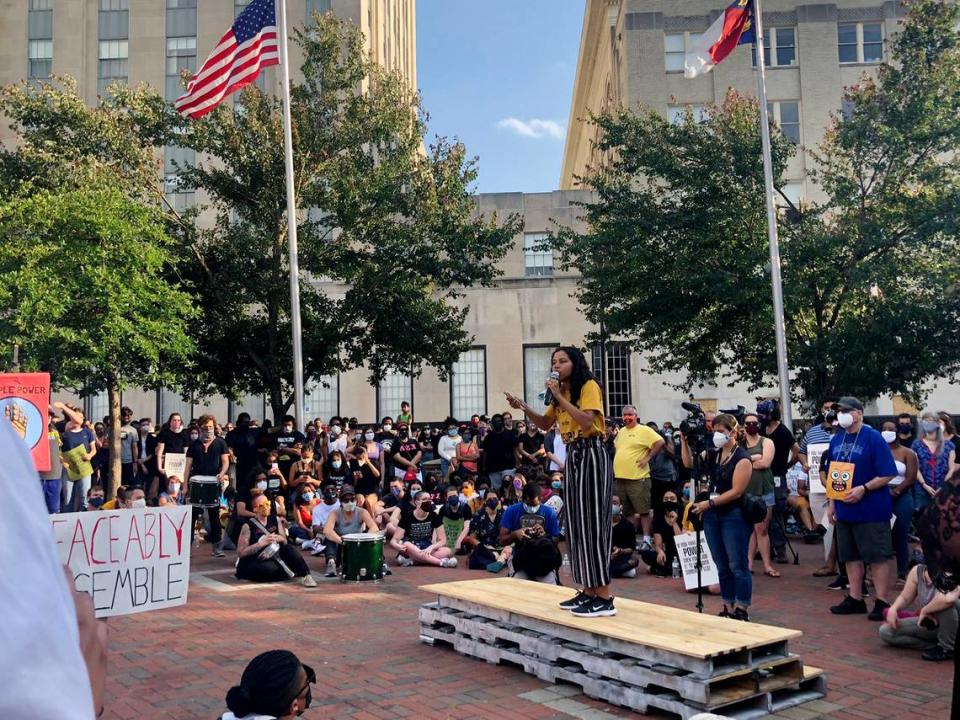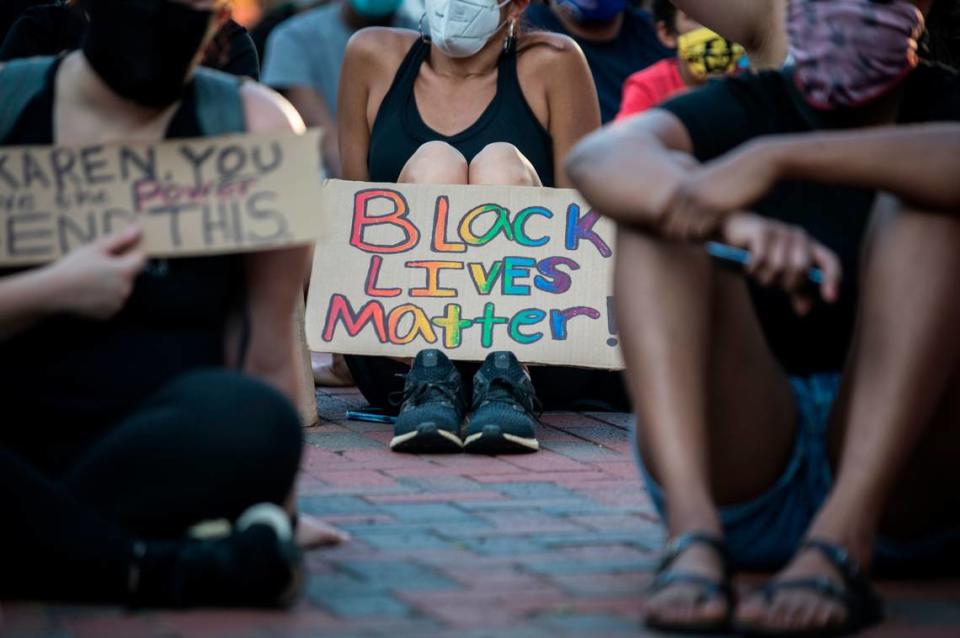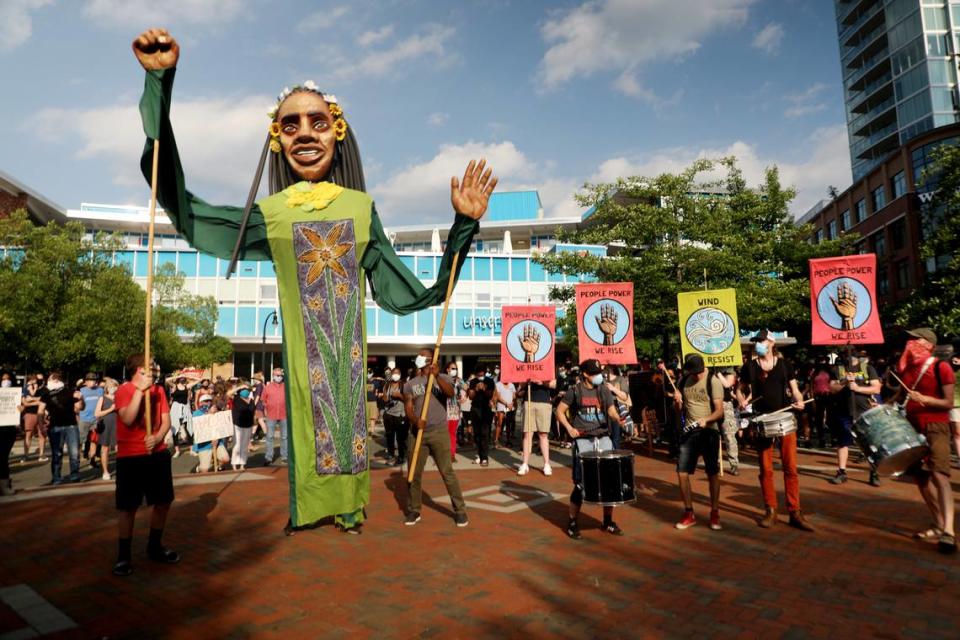‘You will not steal any more lives.’ Durham protesters hold downtown vigil, lower flag
On a day when a memorial service was held for the slain George Floyd in Minneapolis, peaceful protests continued Thursday in Durham to celebrate his life, mourn his death and oppose systematic racism.
Floyd’s killing by police officers in Minneapolis has led to tumult in some cities across the nation; emotional confrontations during protests that have turned violent at times. Durham has not been one of those cities, as city council member Mark-Anthony Middleton noted Thursday at a virtual council meeting.
“Our record has been established,” he said. “This is Durham. We welcome free speech and protest in Durham.”
On Thursday, about 500 people gathered about 6 p.m. at the CCB Plaza in downtown. A candlelight vigil and march had been planned as part of #OccupyBlackWallStreet hosted by Aissa Dearing and Elijah King, local youth organizers.
While one protester read a poem listing the names of black men killed for the color of their skin — from Emmett Till to Michael Brown to Tamir Rice — another protester lowered the American flag over the plaza to half-staff. The poem ended: “You will not steal any more of our lives.”
Dearing, a recent high school graduate and organizer of the vigil, told the crowd that systemic racism in society needs to be addressed and changed — not just police brutality.
Dearing said she wanted the vigil to start expanding the message of the protests to issues beyond police brutality where race also plays a disproportionate role.
“That’s critical, because I have heard a lot of comments about how Durham is immune to racism and that I am so lucky to live in such a progressive city as if we didn’t have racial injustice in this city,” she said.
But in Durham, she said, “All of our [public] housing communities are not up to federal standards and are literally poisoning people and making them not safe.” She referenced McDougald Terrace, where residents were forced out by high levels of carbon monoxide.

Durham county commissioner Brenda Howerton spoke to the crowd about the death of her son at the hands of police.
“This happened before there were cameras,” she said. “And we’re still living this crap today.”
William Barber III said police violence is part of a “system” of white supremacy and a reason for longevity in movement for change. Barber is the son of the Rev. William Barber II, a North Carolina activist and founder of the Poor People’s Campaign.
“This is a war of attrition ... We can’t let this movement burn out,” said Barber, a recent graduate of UNC Law School.
Durham police shot and killed six people from 2015 to 2020, according to a database of police shootings maintained by The Washington Post. Five of the six people were African-American. On May 1, an off-duty police officer shot a man while responding to the sound of gunfire at his apartment complex, according to a release from the Durham Police Department.
Barber quoted Coretta Scott King, saying, “Starving a child is violence. Neglecting school children is violence. Punishing a mother and her family is violence.”
Barber ended his talk by telling a cheering crowd that directing $71.3 million into a new police station in Durham is violence, too.

Protesters speak on various issues
Speakers talked about other issues Thursday: education, housing, poverty, the environment. There was little police presence.
A number of speakers discussed what they called overlapping systems of injustice that can lead to police brutality.
“Ahmaud Arbery was not lynched solely because two white people are bigots, but because our housing system has created the insular narrative that tells us that certain people belong and other people don’t,” said Dan McKinney, director of youth engagement for the non-profit Made in Durham.
Arbery, a 25-year-old black man, was killed in February by two armed white men in Georgia while jogging. The two, a father and son, were charged with murder.
“His murder does not mean that our housing and education systems are broken,” McKinney said. “Rather it tells us that these two systems are doing exactly what they were designed to do, ensuring that white land and property remain under white control.”
Cara Adams, 29, attended the Durham demonstration, saying it was her first since Floyd was killed. She said watching some of police officers’ violent responses to protesters across the country made her nervous about protesting. But she said the Durham police department’s peaceful response so far to the protests made her feel safe coming out.
“People are tired,” Adams said. “Black people are tired of getting killed, and something has to change. We want this to be peaceful. It looks like it’s going to stay peaceful.”

Jasmine Williams, 25, from Durham, said she has been encouraged by the momentum at protests across North Carolina and the rest of the country. She said it’s time to capitalize on that momentum and make concrete changes.
“I think for a lot of people, awareness is becoming stronger and stronger. The levees have broke not just for black people but for injustices around the world,” Williams said. “Honestly with this momentum, we are not going to see it stop for a while because a lot of change is being done. And the whole point is to make change.”
She said she’s hopeful the protests will create more education around the black experience as well as some concrete political actions such as reducing the budget for police departments.
“You have already seen changes around that in Minneapolis and Los Angeles,” she said. “Defunding the police and taking away their budgets. ... I am hopeful that Durham can go in that direction.”
Durham Mayor Steve Schewel said many of the nation’s mayors received communication Wednesday from former President Barack Obama. He said Obama asked that mayors take a pledge that they would work with their police departments and communities in the next 90 days to review their use-of-force policies and see what changes and reform needed to be made.
“I signed that pledge,” Schewel said during the council meeting. “We want our use-of-force policies to be the absolute best model in the nation.”
Police chief addresses incident
Durham police chief C.J. Davis on Thursday afternoon addressed an incident from Wednesday night when a vehicle drove toward a group of protesters.
The group was lying down in a “die-in position” near police headquarters during a moment of silence for Floyd when a vehicle headed in their direction. No one was hit or injured.
Durham police called the investigation ongoing and are seeking information about the incident. Police said they were blocking other roadways and were unable to leave their positions to stop the vehicle.
Davis defended her officers’ actions during the virtual city council meeting, noting the situation was scary for everyone.
“We got blamed for what happened last night, when our efforts and our strategic efforts over the last five days have been all about trying to keep our community safe and make sure they had that open safe space to be able to peacefully protest,” Davis said at the meeting.
“Last night was the first night we had a group of protesters that splintered off into three different locations. And what it required us to do ... we ended up having to take other vehicles and go out to the freeway and to some other locations in the city so we could provide those other groups with that same level of safety.”
Davis said she was in the police command center when the incident occurred.
”Everybody in the command center was screaming because we were trying to figure out where the car came from,” Davis said. “What happened is we believe the car came from one of the arterial streets, Hood Street, we think.
“We had no idea that somebody would sneak round to Hood Street and get on the roadway,” Davis said. “And when they realized people were laying in the roadway, of course they turned around. But it scared everybody. The Police Department would never intentionally allow people to be hurt or harmed in the middle of a protest.”
Durham council member Charlie Reece, who said he has has attended some of the demonstrations, commended the work of Davis and the Durham police during the days of protests.
“The conduct of your officers, the strategy you have put into effect for protecting the right of the people of this city to protest, was exactly what I wanted it to be,” Reece said at the meeting. “I certainly felt protected and I know the other protesters often remarked on it during the protest itself.”
Mayor pro tem Jillian Johnson also praised the work of Davis, saying, “We’ve seen in a lot of other cities how quickly things can escalate and I’m glad we’ve been able to avoid those escalations here in Durham.”

